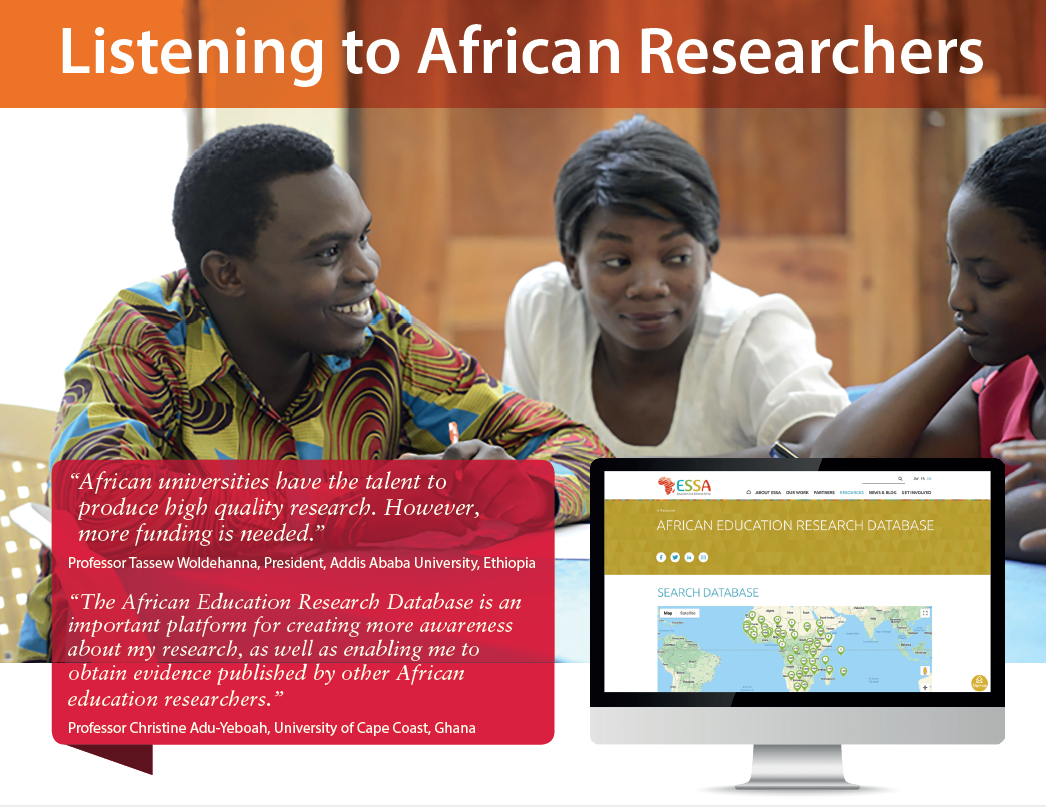Listening to African Researchers: Making sure evidence informs education policy and practice
This blog draws on context-specific evidence imperative for addressing challenges in sub-Saharan Africa, with an analysis of the African Education Research Database.

As education stakeholders increase their efforts to address low learning outcomes for students in sub-Saharan Africa, drawing on context-specific evidence to inform education policy and practice is imperative.
To identify recent trends in the availability of evidence from African researchers, the Research for Equitable Access and Learning (REAL) Centre at the University of Cambridge, together with the charity Education sub-Saharan Africa (ESSA), have updated the African Education Research Database (AERD). The database, established in 2017, includes peer-reviewed publications on education by researchers based in 48 sub-Saharan African countries. In our previous blogs published by the Association for the Development of Education in Africa (ADEA), we highlighted the importance of strengthening the evidence base to inform decision-making in sub-Saharan Africa; and some preliminary analyses of which countries the research was coming from, and the thematic focus.
This new blog draws on findings from bibliometric analysis of over 3,000 publications in the database (AERD). These publications have been identified by our searching articles published in internationally-recognised journals. Given the scope of information available, we focus specifically on articles written in English – French publications are not included in this analysis as our structured searches of relevant databases have identified significantly fewer journal articles, in line with searches undertaken by other researchers. We include articles published over the last decade, 2010 to June 2020, in journals with international coverage and an impact factor of at least 0.2 according to SCImago data.
We use the impact factor as a proxy for quality of the journals, erring on the side of inclusion. Journals identified as predatory were categorised as not reputable. We have chosen this focus because discussions with researchers based in Africa have highlighted that the impact factor of an international journal is an important measure to inform their decision about where to publish. This is partly because publications in ‘higher impact’ journals are considered positively for career progression in African higher education institutions.
Higher education and education technology receive an ever-increasing focus
Since 2010, an ever-increasing proportion of journal articles have focused on higher education. While there was a similar proportion of articles focused on primary, secondary and higher education in the first period we examined (2010-2013), by the most recent period (2019-2020) almost half of all publications were on higher education, with a notable decline in those on primary education in particular. By contrast, there has hardly been any change in the proportion of publications in early childhood education or technical and vocational education and training (TVET), which remain extremely low.
In the database, it is possible to identify publications according to their thematic area. There has not been much change in areas of thematic research focus, with language and curriculum, and teachers and teaching continuing to receive most of the attention. It is noticeable that education technology has experienced a consistent increase. In 2010-2013, education technology was the least researched theme, accounting for less than 5% of the thematic focus. However, by 2019-2020, it had risen to become the third most researched area, representing around 14% of the publications.
This increasing trend has happened before publications relating to COVID-19 would have been available. It is likely that publications since the pandemic will further reinforce this trend. The increased focus on technology could be linked to the increase in research on higher education over the same period. In the last few years, technology has increasingly been identified as an important tool to increase access to higher education in sub-Saharan Africa, given low participation rates.
Overall, research outputs have increased, and more articles are being published in ‘higher impact’ journals and as open access. This demonstrates the capacity of African researchers to produce high-quality research.
We hope that the African Education Research Database will continue to be a useful resource for researchers and policy actors on the continent, as well as to enhance the visibility and use of African research globally.
The African Education Research Database can be accessed here.
Further publications drawing on the Database can be accessed here.
This blog was first published on the ADEA website.